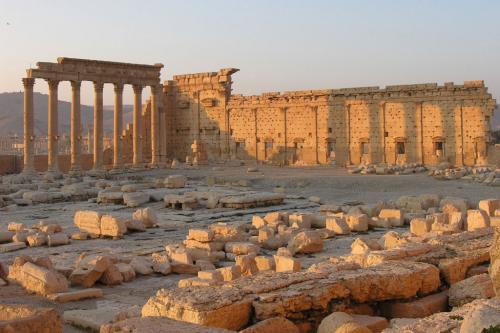Building peace requires culture, education – message of historic UN Security Council resolution
Univocally condemning unlawful destruction and pillaging of cultural heritage such as religious sites and artefacts, the United Nations Security Council adopted an historic resolution that is expected to strengthen protections for such heritage during armed conflicts where they are most vulnerable onMar 24.

Destruction at the World Heritage site of Palmyra in Syria.
“The deliberate destruction of heritage […] has become a tactic of war to tear societies over the long term, in a strategy of cultural cleansing,” said Irina Bokova, the Director-General of the UN Educational, Scientific and Cultural Organization (UNESCO) following the resolution’s adoption.
“This is why defending cultural heritage is more than a cultural issue, it is a security imperative, inseparable from that of defending human lives,” she added.
The briefing by Ms. Bokova to the Security Council was the first time a head of UNESCO has been invited in that capacity.
In her briefing, she explained that since the adoption of Resolution 2199 (in 2015), which prohibits trade in cultural property from Iraq and Syria, efforts were well-underway to disrupt terrorist financing through the illicit trafficking of antiquities.
“Together, UNESCO, INTERPOL, the UN Office on Drugs and Crime (UNODC), customs services, the private sector and museums are all bolstering cooperation, coordinating new action,” she noted.
Through the newly-adopted resolution, the Security Council also underlined that such destruction can hamper post-conflict reconciliation, undermine economic and cultural development and, that, in certain conditions, could constitute a war crime.
“Weapons are not enough to defeat violent extremism. Building peace requires culture also; it requires education, prevention, and the transmission of heritage,” added Ms. Bokova.
“This is the message of this historic resolution,” she stated.
Need for supply chain integrity and stopping illicit trade of cultural property
Also on Mar 24, the top UN political official said that in addition to making every effort to implement the international legal and normative framework on protection of culture, as well as strengthen international cooperation, a response was needed from global criminal justice to prevent trafficking in cultural property by disrupting organized criminal and terrorist networks.
“We need to put a stronger focus on investigation, cross-border cooperation and exchange of information, and on bringing in private and public sector partners, including dealers and the tourism sector, to promote supply chain integrity and stop the illicit trade and sale of cultural property.”
Yury Fedotov, the Executive Director of UNODC also welcomed the resolution’s emphasis on international cooperation in crime prevention and criminal justice responses to counter trafficking in cultural property.
“The resolution […] addresses the vital issue of trafficking in cultural property as a source of terrorism financing, and also sets out ways of protecting cultural heritage during armed conflict where it is most vulnerable,” he said, noting that it strengthened the international community's ability to tackle the issue and help acts that fund terrorism, and enable yet more destruction and looting of cultural sites and archaeological treasures.
Also speaking at the Security Council, Commander Fabrizio Parulli of the Carabinieri Italiani (the national gendarmerie of Italy) and the UNESCO Unite4Heritage task force shared the latest data on illicit trafficking, and said that over the course of last year, 800,000 artefacts had been seized by Italian forces in the fight against the financing of criminal activities.
Source:United Nations
- 232 reads
Human Rights
Ringing FOWPAL’s Peace Bell for the World:Nobel Peace Prize Laureates’ Visions and Actions

Protecting the World’s Cultural Diversity for a Sustainable Future

The Peace Bell Resonates at the 27th Eurasian Economic Summit

Declaration of World Day of the Power of Hope Endorsed by People in 158 Nations

Puppet Show I International Friendship Day 2020

